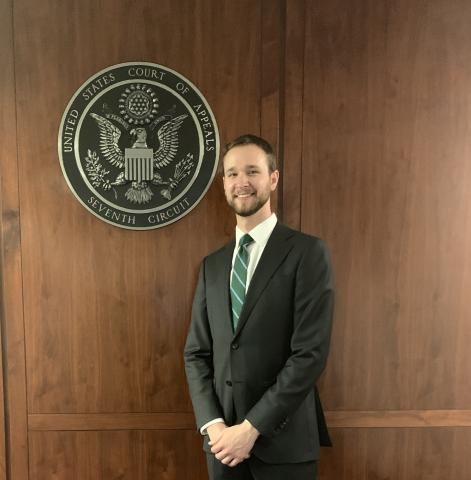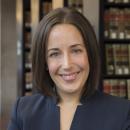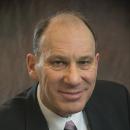Supreme Court and Appellate Clinic Wins Seventh Circuit Appeal
The Law School’s Jenner & Block Supreme Court and Appellate Clinic won a significant appeal in the US Court of Appeals for the Seventh Circuit on May 3 on behalf of a client who lost his vision in prison.
Clinic students spent months preparing opening and reply briefs in the appeal, which centered on the lower court’s decisions not to appoint counsel for the client (who was pro se throughout the lower court proceedings) and to grant summary judgment. Mariah Slocum, ’19, researched and drafted the appointment of counsel argument on which the panel based its decision, and Eric Petry, ’19, argued the case, Pennewell v. Parish, et al., before a three-judge panel in April.
“We are extremely proud of all of our students’ excellent and hard work on this case,” said Professor Sarah M. Konsky, the clinic’s director. “The students carefully studied the record, thoughtfully analyzed the legal questions, and wrote strong briefs. Eric also did a great job arguing the case.”
The clinic’s client entered Wisconsin state prison blind in his left eye and, while incarcerated, became legally blind in his right eye. He filed a pro se complaint alleging that prison medical providers were deliberately indifferent to his medical needs –— including a detached retina in his right eye —– in violation of the Eighth Amendment. The district court denied his requests for appointment of counsel and then granted summary judgment for the defendants. The Seventh Circuit appointed the clinic to handle his appeal.
The clinic argued that the district court abused its discretion in denying the client’s motions for appointment of counsel, especially given the complexities of the case, the client’s circumstances, and the prejudice to the client. The clinic also argued that the district court erred in granting summary judgment. In a published opinion by Judge William Bauer, the Seventh Circuit vacated the district court’s judgment and remanded the case to the district court for further proceedings.
“The district court held that based on his adequate pleadings [the clinic’s client] was competent to litigate the case alone during the advanced pre-trial stages of the litigation,” Bauer wrote. “Because this determination was an abuse of discretion and the district court failed to give [his] motion particularized consideration, we reverse and remand with instructions to recruit counsel.”
Konsky called the panel’s decision “a positive development in the law.”
“It makes clear that district courts must engage in particularized analyses when deciding motions for appointment of counsel in civil cases—and that this must include looking forward to the advanced stages of the litigation, once the case is past the pleading stage, “ she said. “More importantly, we’re relieved that our client will have the opportunity to have his day in court with the help of a lawyer.”
The Jenner & Block Supreme Court and Appellate Clinic, launched at the Law School in 2016, represents parties and amici curiae in cases before the United States Supreme Court, the Seventh Circuit, and other appellate courts. David A. Strauss, the Gerald Ratner Distinguished Service Professor of Law, and Lecturer Matthew S. Hellman of Jenner & Block LLP are also part of the clinic’s faculty.
Petry, who argued the appeal before judges Bauer, Daniel Manion, and Ilana Rovner, prepared at length for the argument, including by doing moot arguments with clinic students and Law School faculty.
Many of the clinic’s students also worked on the appeal. In addition to Petry and Slocum, clinic students Andy Osborne, ’20, and Courtney Block, ’19, researched and drafted substantial sections of the clinic’s briefs. Other clinic students worked on other aspects of the case—from debating case strategy to editing the briefs.
“This case was a great learning opportunity for the students,” Konsky said. “It challenged them to dive into the record and case law, and then figure out the best arguments for our client. They did impressive work, from start to finish.”


